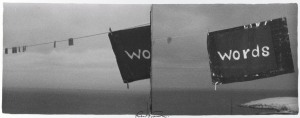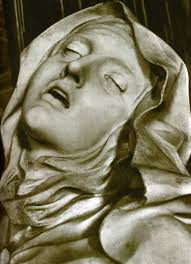.
..does the pleasure of writing exist? I don’t know. One thing I feel certain of is that there’s a tremendous obligation to write. This obligation to write, I don’t really know where it comes from. As long as we haven’t started writing, it seems to be the most gratuitous, the most improbable thing, almost the most impossible, and one to which, in any case, we’ll never feel bound. Then, at some point – is it the first page, the thousandth, the middle of the first book, or later? I have no idea – we realize that we’re absolutely obligated to write. This obligation is revealed to you, indicated in various ways. For example, by the fact that we experience so much anxiety, so much tension if we haven’t finished that little page of writing, as we do each day. By writing that page, you give yourself, you give to your existence, a form of absolution. That absolution is essential for the day’s happiness. It’s not the writing that’s happy, it’s the joy of existing that’s attached to writing, which is slightly different. This is very paradoxical, very enigmatic, because how is it that the gesture – so vain, so fictive, so narcissistic, so self-involved – of sitting down at a table in the morning and covering a certain number of blank pages can have this effect of benediction for the remainder of the day? How is the reality of things – our concerns, hunger, desire, love, sexuality, work – transfigured because we did that in the morning, or because we were able to do it during the day? That’s very enigmatic. For me, in any case, it’s one of the ways the obligation to write is manifested.
This obligation is also indicated by something else. Ultimately, we always write not only to write the last book we will write, but, in some truly frenzied way – and this frenzy is present even in the most minimal gesture of writing – to write the last book in the world. In truth, what we write at the moment of writing, the final sentence of the work we’re completing, is also the final sentence of the world, in that, afterward, there’s nothing more to say. There’s a paroxysmal intent to exhaust language in the most insignificant sentence. No doubt this is associated with the disequilibrium that exists between speech and language. Language is what we use to construct an absolutely infinite number of sentences and utterances. Speech, on the contrary, no matter how long or how diffuse, how supple, how atmospheric, how protoplasmic, how tethered to its future, is always finite, always limited. We can never reach the end of language through speech, no matter how long we imagine it to be. This inexhaustibility of language, which always holds speech in suspense in terms of a future that will never be completed, is another way of experiencing the obligation to write. We write to reach the end of language, to reach the end of any possible language, to finally encompass the empty infinity of language through the plenitude of speech.
Another reason why writing is different from speaking is that we write to hide our face, to bury ourselves in our own writing. We write so that the life around us, alongside us, outside, far from the sheet of paper, this life that’s not very funny but tiresome and filled with worry, exposed to others, is absorbed in that small rectangle of paper before our eyes and which we control. Writing is a way of trying to evacuate, through the mysterious channels of pen and ink, the substance, not just of existence, but of the body, in those minuscule marks we make on paper. To be nothing more, in terms of life, than this dead and jabbering scribbling that we’ve put on the white sheet of paper is what we dream about when we write. But we never succeed in absorbing all that teeming life in the motionless swarm of letters. Life always goes on outside the sheet of paper, continues to proliferate, keeps going, and is never pinned down to that small rectangle; the heavy volume of the body never succeeds in spreading itself across the surface of paper, we can never pass into that two-dimensional universe, that pure line of speech; we never succeed in becoming thin enough or adroit enough to be nothing more than the linearity of a text, and yet that’s what we hope to achieve. So we keep trying, we continue to restrain ourselves, to take control of ourselves, to slip into the funnel of pen and ink, an infinite task, but the task to which we’ve dedicated ourselves. We would feel justified if we no longer existed except in that minuscule shudder, that infinitesimal scratching that grows still and becomes, between the tip of the pen and the white surface of the paper, the point, the fragile site, the immediately vanished moment when a stationary mark appears once and for all, definitively established, legible only for others and which has lost any possibility of being aware of itself. This type of suppression, of self-mortification in the transition to signs is, I believe, what also gives writing its character of obligation. It’s an obligation without pleasure, you see, but, after all, when escaping an obligation leads to anxiety, when breaking the law leaves you so apprehensive and in such great disarray, isn’t obeying the law the greatest form of pleasure? To obey an obligation whose origin is unknown, and the source of whose authority over us is equally unknown, to obey that – certainly narcissistic – law that weighs down on you, that hangs over you wherever you are, that, I think, is the pleasure of writing…
…I’m not an author. First of all, I have no imagination. I’m completely uninventive. I’ve never even been able to conceive of something like the subject of a novel…I place myself resolutely on the side of the writers [in distinction – Roland Barthes – from authors] those for whom writing is transitive. By that I mean those for whom writing is intended to designate, to show, to manifest outside itself something that, without it, would have remained if not hidden at least invisible. For me, that’s where, in spite of everything, the enchantment of writing lies…I’m simply trying to make apparent what is very immediately present and at the same time invisible…I’d like to reveal something that’s too close for us to see, something right here, alongside us, but which we look through to something else…to define the proximity around us that orients the general field of our gaze and our knowledge…
So, for me, the role of writing is essentially one of distancing and of measuring distance. To write is to position oneself in that distance that separates us from death and from what is dead…I’m in the distance between the speech of others and my own…In exercising my language, I’m measuring the difference with what we are not, and that’s why I said to you earlier that writing means losing one’s own face, one’s own existence. I don’t write to give my existence the solidity of a monument. I’m trying to absorb my own existence into the distance that separates it from death and, probably, by that same gesture, guides it toward death…
I’dd add that, in one sense, my head is empty when I begin to write, even though my mind is always directed toward a specific object. Obviously, that means that, for me, writing is an exhausting activity, very difficult, filled with anxiety. I’m always afraid of messing up; naturally, I mess up, I fail all the time. This means that what encourages me to write isn’t so much the discovery or certainty of a certain relationship, of a certain truth, but rather the feeling I have of a certain kind of writing, a certain mode of operation of my writing, a certain style that will bring that distance into focus…








